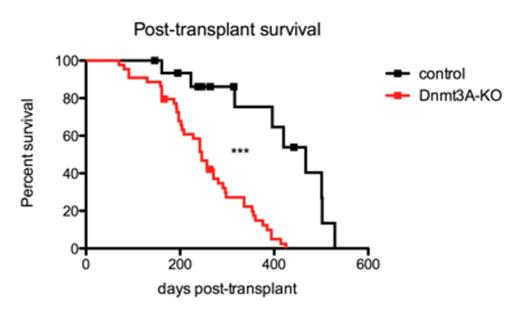Abstract
DNA methyltransferase 3A (DNMT3A), a de novo DNA methyltransferase, is mutated in various hematological malignancies affecting both myeloid (20%), mixed (50%), and lymphoid (18%) malignancies and is associated with poor prognosis. The most frequently reported DNMT3A mutation is R882 in acute myeloid leukemia (AML), which results in altered enzyme activity, but various missense and nonsense mutations have also been found throughout the gene, suggesting that loss-of-function mutations in DNMT3A may also contribute to leukemogenesis. Our group recently showed that transplantation of HSCs from Dnmt3a knock-out (KO) mice led to increased hematopoietic stem cell (HSC) self-renewal and inhibition of differentiation, but was insufficient to cause transformation. However, in these experiments, Dnmt3a-KO HSCs were transplanted alongside wild-type whole bone marrow to quantitate HSC function, potentially protecting against malignant transformation.
Mice transplanted with Dnmt3a-KO HSCs succumb to hematologic malignancies
Here, we show that Dnmt3a deletion in noncompetitive transplanted HSCs leads to an array of hematologic disorders that models the spectrum of disorders seen in human malignancies. Since DNMT3A mutations are known early genetic lesions in leukemia development, mutations that cooperate with DNMT3A might influence the type of disease developed. This mouse model serves to validate an important role for Dnmt3a in the development of hematologic malignancies, and is also valuable for the study of future targeted therapies.
Mice transplanted with Dnmt3a-KO HSCs died significantly earlier than mice transplanted with control HSCs (median survival 246 days and 467 days, p<0.0001). Fifty and 20 female mice were transplanted with 500 Dnmt3a-KO or control HSCs respectively, all at 6-8 weeks of age. Censored points indicate mice that were euthanized for unrelated reasons.
No relevant conflicts of interest to declare.
Author notes
Asterisk with author names denotes non-ASH members.


This feature is available to Subscribers Only
Sign In or Create an Account Close Modal